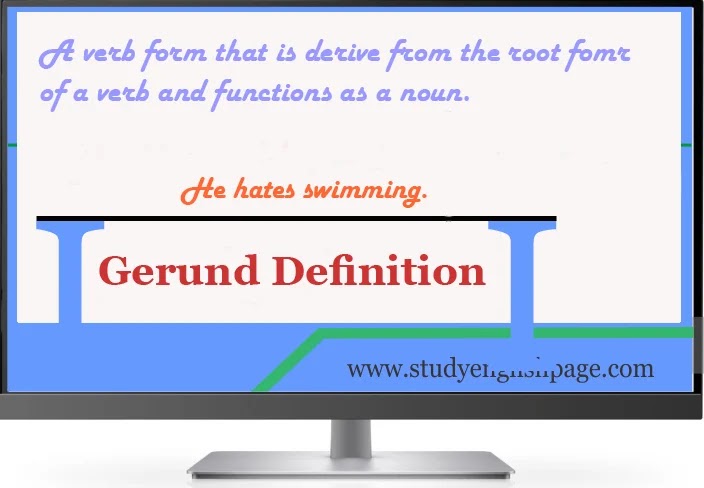Gerund Definition
We are going to study the grammatical topic gerund in this article. You may have used it a lot in your daily life. You may not have noticed that you have used it in your daily life. In this article, we will not only study the gerund definition but also its formation, uses, functions, types, identification, and other related points.
Gerund Definition
A gerund is a verb form that is derived from the root form of a verb and functions as a noun. A gerund is the form of a verb that shows an activity. The verb form of a verb looks like the name of a thing (activity).
- I enjoy hiking when I am with my friends.
The word “hiking” is a gerund in this sentence. It is derived from the root form of the verb “to hike” by adding the suffix “ing”. Now, it does not show an action and it looks like a thing.
- Walking early in the morning makes you healthy and wealthy.
The word “walking” is a gerund in this sentence. It is the ing-from of the verb that is derived from the verb “to walk”. In this sentence, it does not tell us that someone is walking. It tells us that walking is an activity that makes you healthy and wealthy.
How to Form a Gerund
A gerund is formed by adding the suffix “ing” to the root form of a verb. Adding “ing” to the root form of a verb, some spelling changes are brought. If you want to study the complete rules, visit spelling rules for adding “ing” to verbs.
- Go going
- Hike hiking
- Walk walking
- Cry crying
- Celebrate celebrating
Remember that the ing-form is considered a gerund only when it functions as a noun.
Gerund in Negative
To make a gerund negative, we add the word “not” before a gerund to make a gerund negative. The negative gerund is used for the absence of activity a gerund is used for.
- Not celebrating the event is regrettable.
- Not sleeping has become the cause of his illness.
Uses of Gerund
Gerund as a Subject
- Cooking became my fortune.
- Studying is the thing that is rewarded.
Gerund as a Subject Complement
- His profession was fishing.
- The most tough and interesting profession is teaching.
Gerund as a Direct Object
- We should improve our writing.
- I hate laughing in public places.
Gerund as an Indirect Object
- I have never given studying time.
- I give jogging a break.
Gerund as an Object Complement
- You can call it mobilizing.
- We considered that performance deceiving.
Gerund as an Object of a Preposition
- It depends on working.
- I will think about going abroad.
How to Identify a Gerund?
There are some steps to identify a gerund:
1. Identify the verb form made by adding the word “ing”.
2. Check the function of the ing-form of the verb.
3. If the function of the verb is as a noun, the verb form is a gerund.
- You need to have hiking sticks.
The verb “hiking” is the ing-form. Does it function as a noun? No, it functions as an adjective. The verb is not a gerund.
- They were hiking yesterday.
The verb “hiking” is the ing-form. Does it function as a noun? No, it functions as a verb. The verb is not a gerund.
- My father liked hiking.
The verb “hiking” is the ing-form. Does it function as a noun? Yes, it functions as a noun. The verb is a gerund.
Gerund Examples
- She is good at reporting.
- I finished doing my homework.
- Booking the seats was my duty.
- Leaving her alone is nonsense!
- Do they like swimming in the pool?
- Taking photos here is prohibited.
- The kids enjoyed watching the movie.
- His talking to the president has been recorded.
- Remember closing the widows because it is very cold.
- You should study the spelling rules for adding “ing” to verbs.
Gerund and Gerund Phrase
According to their functions, they are the same thing. They function as a noun. A gerund is a single word and a gerund phrase is a group of words. A phrase that is formed by a gerund and its related words.
- Do you want to give time to jogging? (Gerund)
- She gives more time to watching TV. (Gerund phrase)
Gerund and Present Participle
We have mentioned earlier that a gerund is the ing-form of a verb functioning as a noun. A present participle is also the ing-form of the verb, but it functions as a verb or an adjective.
- I don’t like sleeping on the bed. (Gerund)
- You need to buy a sleeping bag for yourself. (Present participle)
- They were sleeping while I was doing my homework. (Present participle)
Frequently Asked Questions
What are verbal nouns?
They are nouns that we derive from the root form of a verb by adding “ing” to the verb. Sometimes, they don’t function as gerunds. They have their plural forms. They don’t take objects and cannot be modified by adverbs. They describe physical objects but not activities.
- They have to present their paintings in the show.
Why do we use gerunds?
Gerunds are used to show actions abstractly. You can use gerunds to show activities as things.
- She hates swimming.

